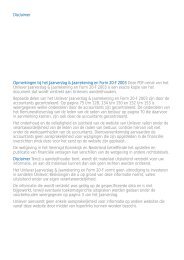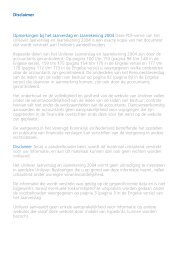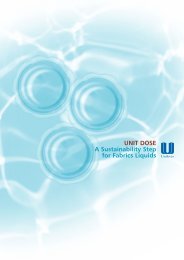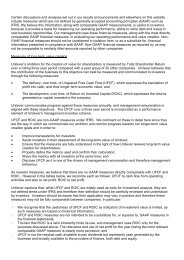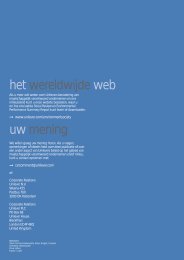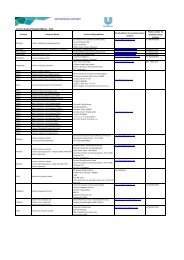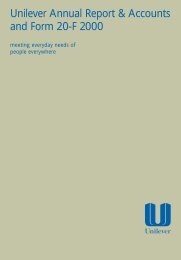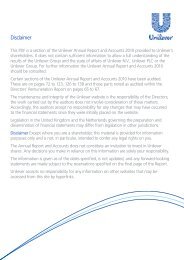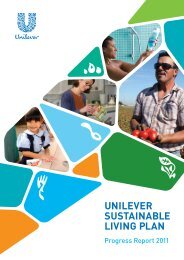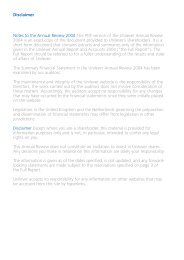Meeting everyday needs of people everywhere - Unilever
Meeting everyday needs of people everywhere - Unilever
Meeting everyday needs of people everywhere - Unilever
Create successful ePaper yourself
Turn your PDF publications into a flip-book with our unique Google optimized e-Paper software.
Control <strong>of</strong> <strong>Unilever</strong><br />
ensure that shareholders <strong>of</strong> NV and PLC received shares<br />
in equal proportions, using the ratio <strong>of</strong> Fl. 12 NV nominal<br />
share capital to £1 PLC nominal share capital. The<br />
subscription price for one new NV share would have to be<br />
the same, at the prevailing exchange rate, as the price for<br />
6.67 new PLC shares.<br />
Under the Equalisation Agreement (as amended in 1981)<br />
the two companies are permitted to pay different<br />
dividends in the following exceptional circumstances:<br />
•<br />
•<br />
if the average annual sterling/guilder exchange rate<br />
changed so substantially from one year to the next<br />
that to pay equal dividends at the current exchange<br />
rates, either NV or PLC would have to pay a dividend<br />
that was unreasonable (i.e. substantially larger or<br />
smaller in its own currency than the dividend it paid<br />
in the previous year).<br />
the government <strong>of</strong> the United Kingdom or the<br />
Netherlands could in some circumstances place<br />
restrictions on the proportion <strong>of</strong> a company’s pr<strong>of</strong>its<br />
which can be paid out as dividends. This could mean<br />
that in order to pay equal dividends one company<br />
would have to pay out an amount which would<br />
breach the limitations in place at the time, or that the<br />
other company would have to pay a smaller dividend.<br />
In either <strong>of</strong> these rare cases, NV and PLC could pay<br />
different amounts <strong>of</strong> dividend if the Boards thought it<br />
appropriate. The company paying less than the equalised<br />
dividend would put the difference between the dividends<br />
into a reserve: an equalisation reserve in the case <strong>of</strong><br />
exchange rate fluctuations, or a dividend reserve in the<br />
case <strong>of</strong> a government restriction. The reserves would be<br />
paid out to its shareholders when it became possible or<br />
reasonable to do so, which would ensure that the<br />
shareholders <strong>of</strong> both companies would ultimately be<br />
treated the same. To date we have never had to use these<br />
measures.<br />
If both companies go into liquidation, NV and PLC will<br />
each use any funds available for shareholders to pay the<br />
prior claims <strong>of</strong> their own preference shareholders. Then<br />
they will use any surplus to pay each other’s preference<br />
shareholders, if necessary. After these claims have been<br />
met, they will pay out any equalisation or dividend reserve<br />
to their own shareholders before pooling the remaining<br />
surplus. This will be distributed to the ordinary<br />
shareholders <strong>of</strong> both companies, once again on the basis<br />
that the owner <strong>of</strong> Fl. 12 nominal NV ordinary share capital<br />
will get the same as the owner <strong>of</strong> £1 nominal PLC<br />
ordinary share capital. If one company goes into<br />
liquidation, we will apply the same principles as if both<br />
had gone into liquidation simultaneously.<br />
More information about our constitutional<br />
documents<br />
Under the Articles <strong>of</strong> Association <strong>of</strong> NV and the<br />
Memorandum and Articles <strong>of</strong> Association <strong>of</strong> PLC both<br />
companies are required to carry out the Equalisation<br />
Agreement with the other. Both documents state that the<br />
agreement cannot be changed or terminated without the<br />
approval <strong>of</strong> both sets <strong>of</strong> shareholders.<br />
For NV the necessary approval is as follows:<br />
•<br />
•<br />
at least one half <strong>of</strong> the total issued ordinary capital<br />
must be represented at an ordinary shareholders<br />
meeting, where the majority must vote in favour; and<br />
(if they would be disadvantaged or the agreement is<br />
to be terminated), at least two thirds <strong>of</strong> the total<br />
issued preference share capital must be represented at<br />
a preference shareholders meeting, where at least<br />
three quarters must vote in favour.<br />
For PLC, the necessary approval must be given by:<br />
•<br />
•<br />
the holders <strong>of</strong> a majority <strong>of</strong> all issued shares voting at<br />
a general meeting; and<br />
the holders <strong>of</strong> the ordinary shares, either by thre e<br />
quarters in writing or by three quarters voting at a<br />
general meeting where the majority <strong>of</strong> the ord i n a r y<br />
s h a res in issue are re p re s e n t e d .<br />
The Articles <strong>of</strong> NV establish that any payment under the<br />
Equalisation Agreement will be credited or debited to the<br />
pr<strong>of</strong>it and loss account for the financial year in question.<br />
The PLC Articles state that the Board must carry out the<br />
Equalisation Agreement and that the provisions <strong>of</strong> the<br />
Articles are subject to it.<br />
We are advised by Counsel that these provisions oblige<br />
the Boards to carry out the Equalisation Agreement,<br />
unless it is amended or terminated with the approval <strong>of</strong><br />
the shareholders <strong>of</strong> both companies. If the Boards fail to<br />
enforce the agreement shareholders can compel them to<br />
do so under Dutch and United Kingdom law.<br />
Mutual guarantee <strong>of</strong> borrowings<br />
There is a contractual arrangement between NV and PLC<br />
under which each will, if asked by the other, guarantee its<br />
borrowings. They can also agree jointly to guarantee the<br />
borrowings <strong>of</strong> their subsidiaries. We use this arrangement,<br />
as a matter <strong>of</strong> financial policy, for certain significant public<br />
borrowings. The arrangements enable lenders to rely<br />
on our combined financial strength.



